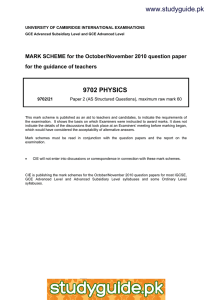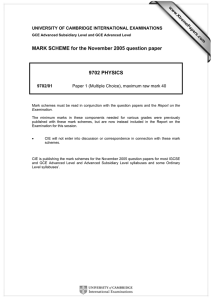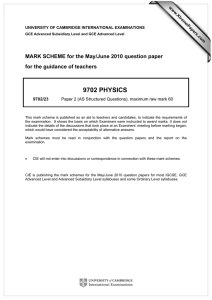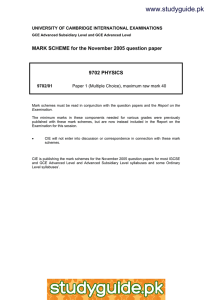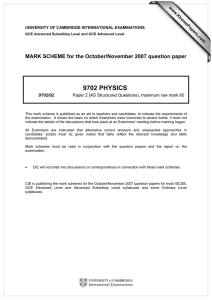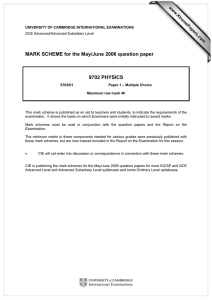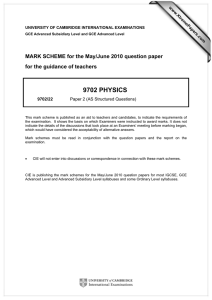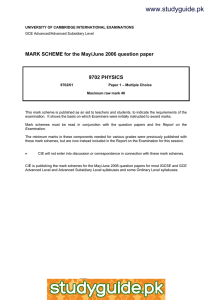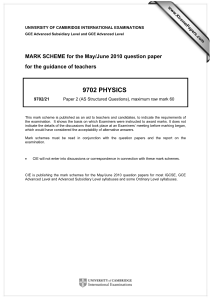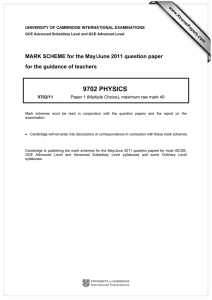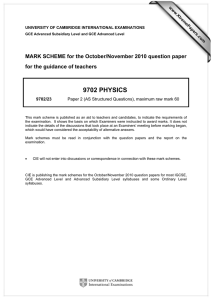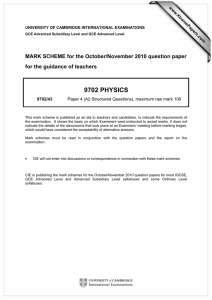9702 PHYSICS MARK SCHEME for the October/November 2010 question paper
advertisement
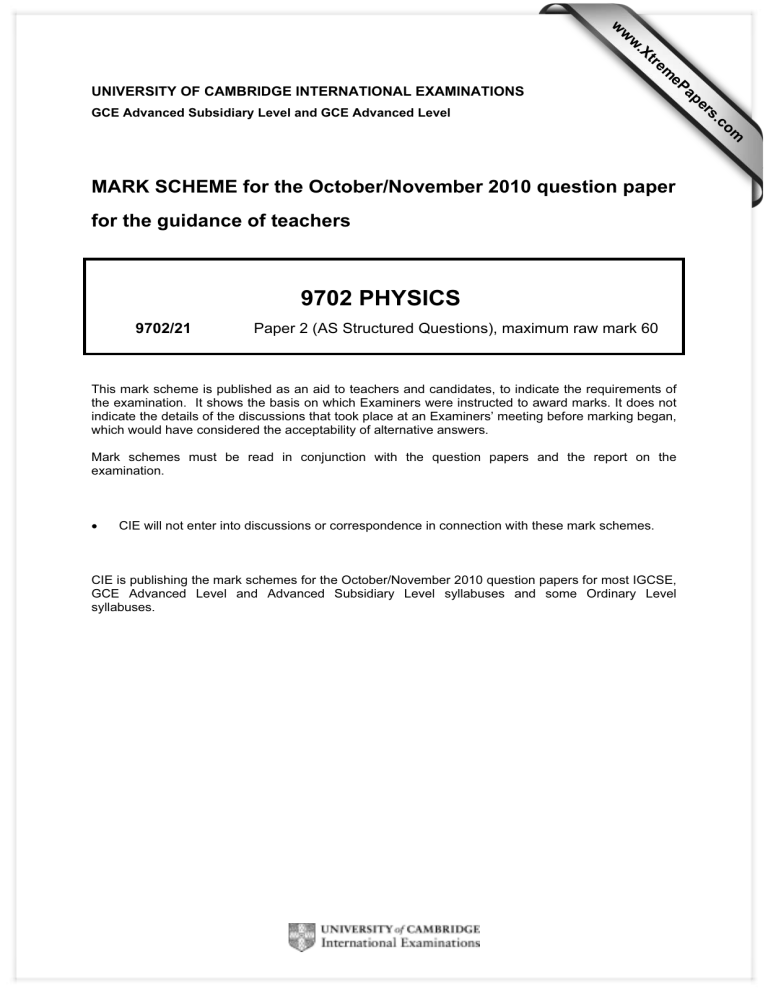
w w ap eP m e tr .X w UNIVERSITY OF CAMBRIDGE INTERNATIONAL EXAMINATIONS for the guidance of teachers 9702 PHYSICS 9702/21 Paper 2 (AS Structured Questions), maximum raw mark 60 This mark scheme is published as an aid to teachers and candidates, to indicate the requirements of the examination. It shows the basis on which Examiners were instructed to award marks. It does not indicate the details of the discussions that took place at an Examiners’ meeting before marking began, which would have considered the acceptability of alternative answers. Mark schemes must be read in conjunction with the question papers and the report on the examination. • CIE will not enter into discussions or correspondence in connection with these mark schemes. CIE is publishing the mark schemes for the October/November 2010 question papers for most IGCSE, GCE Advanced Level and Advanced Subsidiary Level syllabuses and some Ordinary Level syllabuses. om .c MARK SCHEME for the October/November 2010 question paper s er GCE Advanced Subsidiary Level and GCE Advanced Level Page 2 1 Mark Scheme: Teachers’ version GCE AS/A LEVEL – October/November 2010 Syllabus 9702 (a) length, current, temperature, amount of substance, (luminous intensity) any three, 1 each B3 [3] (b) (i) F: kg m s–2 ρ: kg m–3 v: m s–1 B1 B1 B1 [3] M1 A1 [2] (a) (i) horizontal speed constant at 8.2 m s–1 vertical component of speed = 8.2 tan 60° = 14.2 m s–1 C1 M1 A0 [2] (ii) 14.22 = 2 × 9.8 × h (using g = 10 then –1) vertical distance = 10.3 m C1 A1 [2] (iii) time of descent = 14.2 / 9.8 = 1.45 s x = 1.45 × 8.2 = 11.9 m C1 (ii) some working e.g. kg m s–2 = m2 kg m–3 (m s–1)k hence k = 2 2 3 Paper 21 A1 [2] (b) (i) smooth path curved and above given path hits ground at more acute angle M1 A1 [2] (ii) smooth path curved and below given path hits ground at steeper angle M1 A1 [2] B1 [1] C1 A1 [2] M1 A0 [1] C1 C1 A1 [3] C1 A1 [2] (a) force = rate of change of momentum (allow symbols if defined) (b) (i) ∆ρ = 140 × 10–3 × (5.5 + 4.0) = 1.33 kg m s–1 (ii) force = 1.33 / 0.04 = 33.3 N (c) (i) taking moments about B (33 × 75) + (0.45 × g × 25) = FA × 20 FA = 129 N (ii) FB = 33 + 129 + 0.45g = 166 N © UCLES 2010 Page 3 4 Mark Scheme: Teachers’ version GCE AS/A LEVEL – October/November 2010 Syllabus 9702 (a) (i) F / A B1 [1] (ii) ∆L / L B1 [1] (iii) allow FL / A∆L B1 [1] B1 [1] M1 A0 [1] (iv) allow ρL / A or ρ (L + ∆L) / A (b) (i) ∆L = FL / EA = (30 × 2.6) / (7.0 × 1010 × 3.8 × 10–7) = 2.93 × 10–3 m = 2.93 mm (ii) ∆R = ρ∆L / A = (2.6 × 10–8 × 2.93 × 10–3) / (3.8 × 10–7) = 2.0 × 10–4 Ω 5 6 Paper 21 C1 A1 [2] (c) change in resistance is (very) small so method is not appropriate M1 A1 [2] (a) when a wave passes through a slit / by an edge the wave spreads out / changes direction M1 A1 [2] (b) diagram: M1 A1 [2] wavelength unchanged wavefront flat at centre, curving into geometrical shadow (c) d sin θ = nλ for θ = 90° 1 / (650 × 103) = n × 590 × 10–9 n = 2.6 number of orders is 2 M1 A1 [3] (d) intensity / brightness decreases (as order increases) B1 [1] (a) (i) either P = V 2 / R R = 4.0 Ω C1 A1 [2] B1 B1 B1 [3] (b) (i) 2.0 kW A1 [1] (ii) 0.5 kW A1 [1] (iii) total resistance = 3R / 2 power = 0.67 kW C1 A1 [2] or C1 P = VI and V = IR (ii) sketch vertical axis labelled appropriately (straight) line from origin then curved in correct direction line passes through 12 V, 3.0 A © UCLES 2010 Page 4 7 Mark Scheme: Teachers’ version GCE AS/A LEVEL – October/November 2010 Syllabus 9702 Paper 21 (a) either different forms of same element or nuclei have same number of protons different numbers of neutrons (in the nucleus) M1 A1 [2] (b) (i) proton number conserved nucleon number conserved mass-energy conserved B1 B1 B1 [3] A1 [1] A1 [1] (ii) 1. Z = 36 2. x = 3 © UCLES 2010
